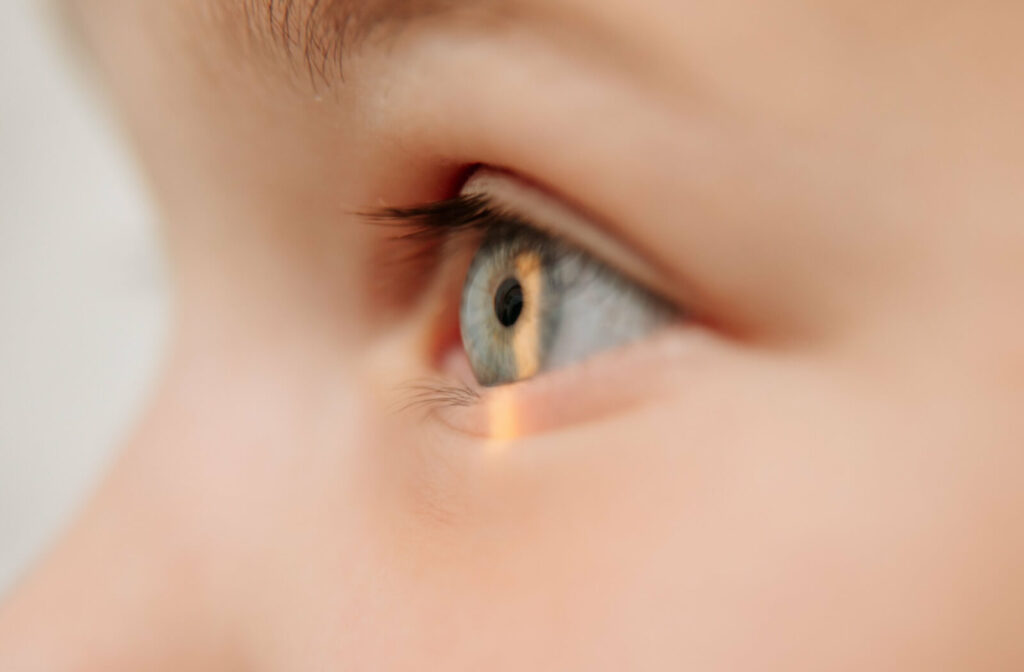In a world filled with colourful books, interactive whiteboards, and digital tablets, children have more ways than ever to engage with learning. But what happens when your child struggles to keep up, leaving you to wonder what’s causing their learning difficulties?
Often, the answer lies in a child’s ability to learn or in their eye health. It’s important to explore any vision changes that may contribute to learning difficulties during your child’s next eye exam.
Vision & Learning
Vision plays a critical role in how children perceive the world around them. From reading to writing, understanding spatial relationships, and even processing visual information, good eyesight is fundamental to a child’s ability to learn.
It’s important to note that a child can have excellent vision acuity (meaning they can see clearly at a distance) but still struggle with other vision issues. These can include problems with eye tracking, focusing, or even coordination between the eyes—issues that can significantly impact a child’s learning experience.
Learning Difficulties That Can Be Detected in an Eye Exam
Certain learning difficulties may be identified or exacerbated by underlying vision problems that can be detected during a comprehensive eye exam. For instance, children with dyslexia, a common reading challenge, often exhibit symptoms related to visual processing. These symptoms may include difficulty tracking words on a page or noticing letter reversals. Eye exams can reveal issues such as convergence insufficiency, where the eyes struggle to work together during near tasks, which can significantly hinder reading ability.
Additionally, conditions like ADHD (attention deficit hyperactivity disorder) may also be linked with visual inefficiencies. Children with ADHD often face challenges with visual concentration and focus, which can mislead caregivers into attributing their learning difficulties solely to attention issues rather than considering possible vision-related factors. Early detection of these vision difficulties through eye exams can lead to appropriate interventions, facilitating better learning outcomes and helping children reach their full academic potential.
In some cases, eye exams may reveal that learning difficulties are part of a broader spectrum of challenges, necessitating a multidisciplinary approach involving educators, pediatricians, and other specialists.
Depending on the issue, solutions might include corrective lenses, vision therapy, or specific exercises designed to improve visual skills.

Signs Your Child Might Need an Eye Exam
While every child is unique, several signs may suggest your child is experiencing vision problems, which can significantly impact their learning and daily activities. Here are some common indicators to watch for:
- Frequent headaches or eye strain: If your child often complains of headaches, especially after prolonged periods of reading or screen time, it might indicate they are straining to see properly.
- Difficulty reading or holding a book too close: Struggling to read the words on a page or holding books unusually close to their face can be a sign of vision difficulties. This behaviour can hinder their ability to enjoy reading and learning.
- Skipping or repeating lines while reading: If you notice your child skipping lines or losing their place frequently while reading, it could be a sign that their vision is not clear or that they are having trouble focusing.
- Reluctance to engage in visual activities: If your child shows a lack of interest in activities that require visual skills, such as drawing, playing games, or watching television, it may indicate they are struggling with their eyesight.
- Squinting or closing one eye to see better: Squinting or covering one eye can be a natural instinct to improve focus, signaling potential vision issues that deserve attention.
- Complaints of blurry vision or double vision: If your child mentions that things look blurry or they see double, these are clear signs that they need a professional evaluation.
If your child exhibits any of these behaviours, it may be time for an eye exam. Early detection and intervention can significantly improve their visual health and overall development.
Why Eye Exams Are Crucial for Detecting Vision Issues
Regular eye exams go beyond simply checking for 20/20 vision. They play a crucial role in a child’s overall development. Optometrists evaluate visual acuity and assess a child’s overall eye health, identifying specific issues that may impact learning and daily activities. They utilize a range of specialized tests tailored to children’s unique needs, such as depth perception, tracking, and colour vision assessments.
Addressing these factors helps make sure that any vision-related barriers to learning are quickly identified and treated, promoting optimal academic performance and confidence in the classroom. Early detection and intervention can make a significant difference in a child’s ability to succeed, as good vision is essential for effective learning and social interaction, with around 80% of learning being visual.
Is It Time to Book Your Child’s Eye Exam?
Eye exams can be a vital tool in addressing learning difficulties in children. By making sure that your child receives regular eye check-ups, you’re taking an essential step toward setting them on a path to academic success and lifelong learning.
Don’t wait until learning challenges become overwhelming—book an eye exam today with Focus West Optometry in Calgary and help give your child clear vision to thrive.



